If you’ve ever lost money to a scam, it’s normal to feel angry, embarrassed, and desperate for help. Maybe you reported it to law enforcement, only to be met with a dead end. In that moment, it’s tempting to turn to social media to vent your frustrations to your friends and family, warn others, and ask if anyone knows how to get your money back. But these posts don’t just reach friends and family, they put blood in the water – and the sharks swarm quickly.
The Seraph Secure team wanted to see just how quickly recovery scammers would appear. Using a fake Facebook page, we posted a dramatic cry for help.
Can anyone help me get my money back? I got scammed again!!! Stupid Facebook needs to get these scammers OFF THE INTERNET!!!”
Within 15 minutes, the comments started pouring in from nine different accounts – not from supportive friends offering advice, but from scammers posing as helpers.
And that was just the beginning.
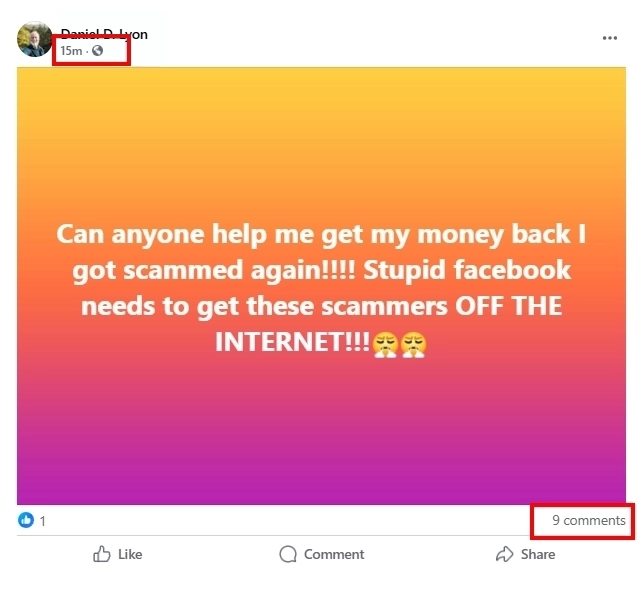
The Recovery Scammer Trap
Recovery scammers prey on people who have already been scammed. They pretend to be experts by claiming they can trace stolen money and hack into scammers’ accounts and crypto wallets. Others impersonate lawyers, investigators, cybersecurity specialists, and even government agencies like the FBI and FTC.
They know that victims are vulnerable and often in a place of desperation, especially when they’re already out thousands or even hundreds of thousands of dollars. Law enforcement agencies are often limited in what they can do with the resources they have, especially in cases of international or crypto-based fraud. These scammers exploit that gap and step in as the “solution.”
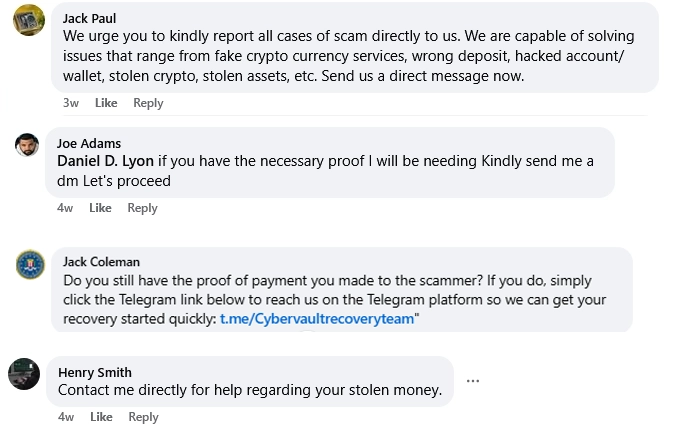
The problem is that once money is sent to a scammer – especially via wire transfer, cryptocurrency, or gift cards – it becomes incredibly difficult, and in most cases impossible, to recover. Stolen funds are moved quickly through layers of accounts and exchanges, often overseas, and vanish beyond reach.
The harsh reality can be tough to face, but once money is in a scammer’s hands, it’s rarely coming back.
That is understandably a very hard truth for victims to come to terms with, and determined not to give up, they turn elsewhere – like social media – to find help. In doing so, they step straight into another trap.
The Social Media Experiment
Within minutes of our post, nine different accounts had commented, urging us to contact recovery services and experts on other platforms like Telegram and WhatsApp. Encrypted and built for anonymity, these apps let scammers operate in the shadows by hiding behind fake names and throwaway accounts.
The moment the scam is done, they vanish and leave victims and law enforcement with no way to hold them accountable.
Over the next two days, the swarm grew.
15 minutes: 9 comments from scammers
16 hours: 41 comments, 14 likes, 1 share
21 hours: 60 comments, 22 likes, 1 share
48 hours: 153 comments, 67 likes, 4 shares
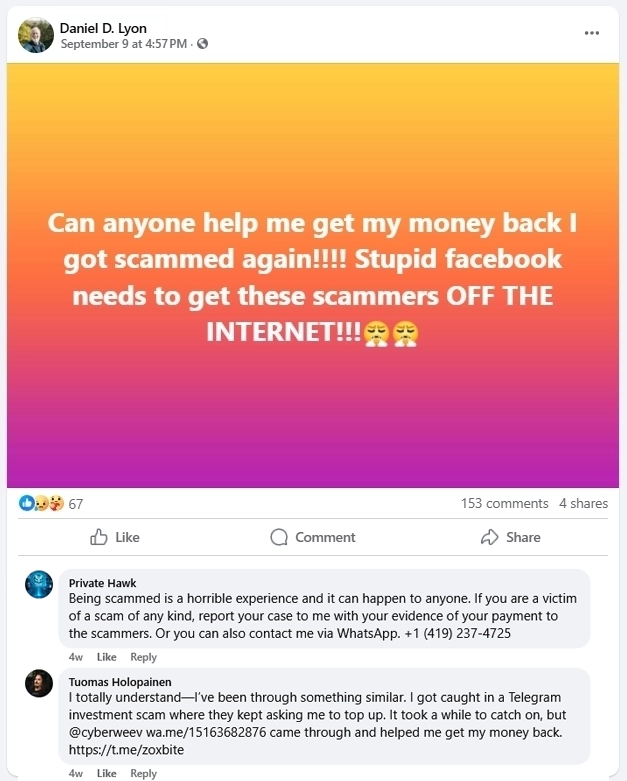
The longer the post stayed up, the more scammers piled on – liking, commenting, and sharing the post to boost its visibility. Some even warned us not to trust “other scammers” in the comments before promoting their own Telegram contact. Others claimed to be Facebook support employees.
Comment after comment promised full recovery, especially if we had “proof” of the scam. Scammers want this so they can weave any information the victim provides into their narrative, tailoring their responses to the victim’s situation to make themselves appear more credible.
If you haven’t guessed already, not a single one of these posts is offering legitimate help – they are all scams.
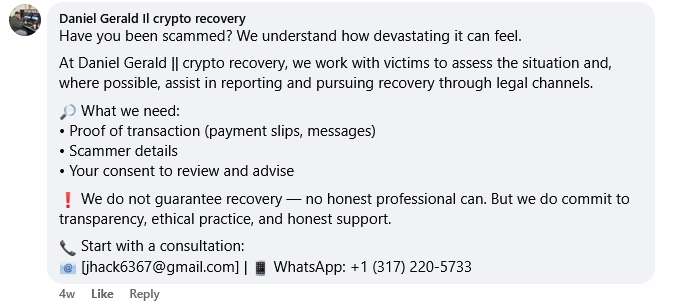
The Algorithm Made It Worse
The comments on our cry-for-help post aren’t the end of the story. Once we hit publish on that post, our entire Facebook feed transformed. Suddenly, every third post was a sponsored ad from another so-called recovery service – fake hackers, fake lawyers, and even fake FBI pages.
It was as if the algorithm picked up on our “interest” in fund recovery services and began pushing more of them into the feed. This highlights a very serious problem – instead of shielding and protecting vulnerable users in distress, social media platforms are actually amplifying exposure to scams by promoting related content.
For someone who has been scammed and is looking for help, that kind of feedback loop can quickly turn into another loss.
The Final Results
By the end of our experiment, our post had drawn in 238 comments, 64 likes, and 8 shares. Even a month after the initial post, scammers continue to comment on it daily. What started as one fake plea for help had quickly spiraled into a feeding frenzy. Nearly every comment was from a recovery scammer, each promising they could help.
Here’s a quick scroll through of all the comments:
It’s a sobering realization that this isn’t one or two bad actors. It’s a systemic problem fueled by platforms that prioritize engagement over safety. To add to our frustration, reporting these scammers usually goes nowhere – believe me, we’ve tried!
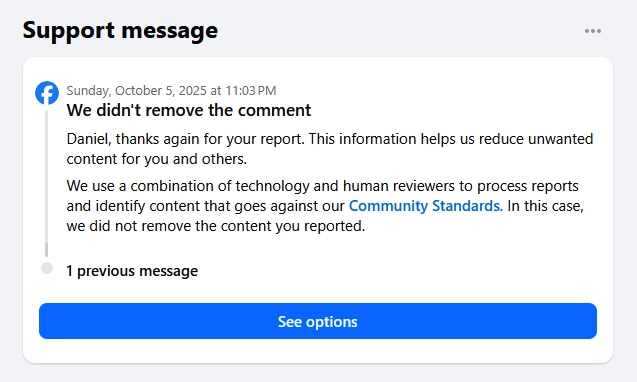
What To Do If You've Been Scammed
Social media platforms likely aren’t changing anytime soon, and until they do, it falls on users to keep themselves safe. The best defense is understanding what to do - and what not to do - after a scam.
1. Report it immediately. Contact your bank, file a report with local law enforcement and any relevant government agencies, and report it to any platforms used. Even if no action can be taken, your report can still help law enforcement find patterns and aid investigations.
2. Check for any chargeback options with your credit card company or bank. Get in touch with the fraud teams of any money transfer services involved and ask about chargebacks or fraud protections. Don’t wait – the sooner you do this, the better.3. Avoid posting about being scammed or losing money publicly on social media. Doing so puts a target on your back. Social media is not a safe recovery channel and posts can draw in predators which put victims at risk again.
Seeking Support and Moving Foward
Being scammed can leave deep emotional and financial wounds. It’s common to feel ashamed, confused, or even to blame yourself. Many victims struggle to trust again or feel paralyzed about what to do next. But what happened does not define you, and you’re not alone in finding your way forward.
If you've been scammed, seeking support is crucial. Reach out to friends, family, or others who have experienced similar situations – they can offer comfort and understanding. If you’re struggling emotionally, consider speaking with a professional, counselor, or advocate who specializes in scam trauma. Remember, you don’t have to face this alone.
Scam victim outreach groups that are dedicated to supporting scam victims and providing resources to aid in the aftermath of a scam are also available to help. For more information, please see our Scam Support page.
Real recovery begins with real support, not another scam.
– The Seraph Secure Team






















